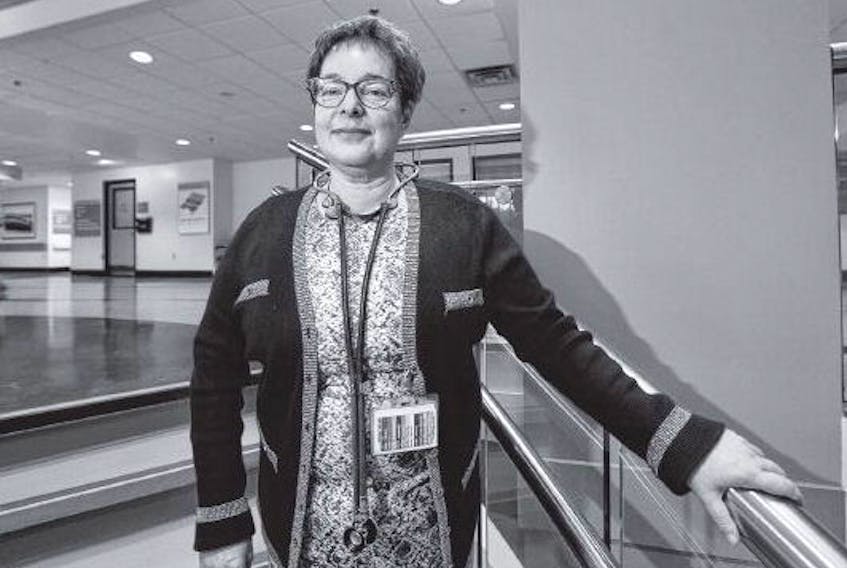Dr. Gabrielle Horne says it’s cost her $1.3 million in legal fees and 14 years of her life to find out that no one is really being held accountable for compounded wrongs against her.
“The wrong that they’ve done is black and white,that’s a matter of fact,” the soft-spoken cardiologist said of Queen Elizabeth II Health Sciences Centre administration, the health
authority that ran it and several of the hospital’s medical staff.
“There is no controversy in this case,” said Horne. “It’s a matter of fact that these people acted in bad faith or malice, it’s a matter of fact that they did this for 14 years, it’s a matter of fact that the senior administration at the health authority and the board and all the lawyers on the hospital side stood behind that all this time. I’ve certainly heard nothing from the premier about it and I’ve not seen any consequences beyond the court decision.”
There were financial consequences for the Nova Scotia Health Authority. In a landmark June 2016 decision, a seven-member Nova Scotia Supreme Court civil jury awarded Horne $1.4 million from the authority for damages to her reputation and the loss of a research career at the
hospital. The jury decided that the health authority had acted in bad faith and was solely responsible for what happened.
Upon appeals from both Horne and the authority, a written decision released Tuesday by a three-judge panel of the Nova Scotia Court of Appeal reduced Horne’s damages to $800,000, stating that the reduced figure better represents the loss of reputation and research career.
The saga began in 2002 when Horne, a Canadian who was born in the United Kingdom and studied medicine there, was a young medical researcher at a cardiac imaging lab at the QEII. Horne and the imaging lab were lauded as global pioneers in a new area of heart failure research. Horne’s division head was Dr. Blair O’Neill and her department head was Dr. Elizabeth Cowden, according to the written court decision. Dr. Jonathan Howlett, also a cardiologist, was director of the heart function clinic. Horne and Howlett did not get along, according to the court document, and he tried to prevent her from screening heart clinic charts for her research.
Howlett complained to O’Neill that Horne was uncollaborative and the division head told Horne in writing that everyone in the heart function group should be offered the opportunity to collaborate in her research. O’Neill also told her that if her behaviour didn’t change that he’d recommend that her privIleges be altered.
Court documents say that the interpersonal dysfunction at the clinic worsened, that Howlett avoided Horne and wrote several letters to O’Neill and others complaining that Horne was uncooperative.
In an October 2002 letter written to Horne andcopied to O’Neill, Howlett said that Horne’s participation in the heart clinic and her lab research were terminated, even though he did not have the authority to do so. O’Neill eventuallyagreed with and accepted that recommendation.Finally in 2006, the then-Capital
Health’s board of directors determined that there was reason for concern about Horne’s activities.
Accordingly, Horne’s privileges were summarily and “wrongly” varied from 2002 to 2006, the court document reads. Horne sued the health authority and others in November 2006.
“I’ve heard the term personality conflict used to describe the situation,” Horne said Wednesday. “That’s not what this is. Personality conflict is a neutral term and what happened here is that someone told stories that weren’t true to professionally destroy a colleague. That’s the most severe form of workplace bullying.”
Witnesses and the 2016 jury agreed.
“My research program shut down because of the wrongful actions of the health authority and I was not able to revive that,” Horne said Wednesday. “The damage done to me is one part of this. Remember that I had many research collaborators, we were all working together on this research. The most important people in the research program were the patients, many of whom have died before the results of this court case. They took part in imaging research to help understand the causes of why patients with health failure get worse and their wish was to be part of something that would help other patients one day. They knew the program was being shut down and they did not see their wish fulfilled.”
The loss of her research was devastating, she said.
“It was terrible at the time and it’s still terrible to me now. It’s really hard to even think about, to know all the way through these 15 years that that just never had to happen. The information that these allegations were false was before the administration and the health authority from the very beginning.”
Horne said she read the court decision and one thing jumped out at her.
“They didn’t take into consideration the fact that I had to report to the people that made these false allegations for 14 years, which was arguably the very worst part of this.”
Horne said her legal fees have topped $1.3 million.
The premier’s office did not offer a statement but Health Minister Randy Delorey, in an emailed reply, said, “We respect the court process and are confident NSHA (the health authority) will make any changes as appropriate as a result of this case.”
The health authority sent out a statement that read, “This has been a lengthy process for all parties and NSHA looks forward to moving on from this matter with a continued focus on fostering an environment for leading health research and care.”
Horne said the health authority statement left her at a loss for words. “For it to not happen again, those responsible have to, in some way, be held accountable,” Horne said. “It’s certainly satisfying to see that the highest court in Nova Scotia has determined that the hospital acted in bad faith or malice in what it did over those 14 years. I believe that this is the first time in Nova Scotian history that a public body has been found guilty of bad faith or malice in a court of law. . . . Even with the reduction, it’s still the highest damages awarded ever in Canada for personal suffering.”
Horne said it’s very unfortunate that the court didn’t recognize her “staggering legal bills.”
“Having been through the justice system I can say that it’s mentally extremely punishing to go through this experience, and if you have to be so wealthy that losing that $1.3 million isn’t a problem and you have to be so tough as to go through all of this, I just don’t think there are many people that could feel they could get justice from the system.”









